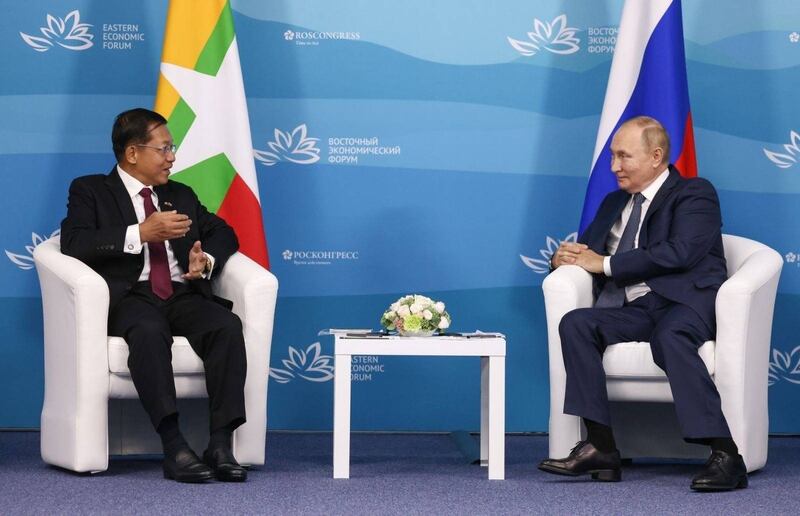UPDATED at 4:02 p.m. EDT on 9-7-2022
Myanmar junta leader Senior Gen. Min Aung Hlaing lauded Russian President Vladimir Putin as a world leader bringing international stability as they held their first face-to-face meeting Wednesday in the eastern Russian city of Vladivostok, state media reported.
Min Aung Hlaing also claimed in an interview that the deepening crisis in his own country is under control. He is making his third trip to Russia since he seized power in a February 2021 coup. Moscow is one of the junta's few allies as it has faced international isolation since the military takeover in Myanmar - not unlike Russia's own diplomatic isolation since the invasion of Ukraine six months ago.
According to Russia's Tass news agency, the junta chief recalled that Russia was "going through difficult times" almost 30 years ago -- an apparent reference to the fall of the Soviet Union.
"With your help, the country is developing intensively," Min Aung Hlaing was quoted as saying during Wednesday’s meeting on the sidelines of the Far Eastern Economic Forum. "One can say that when you started to rule the country, Russia moved to a leadership position globally."
"And we would describe you not just as the leader of Russia, but also as a leader of the world, because you are controlling and organizing stability all over the world," he added.
Myanmar’s Defense Service Information department said the two leaders discussed bilateral cooperation and international issues.
In an interview with Russian state-controlled news agency RIA Novosti, Min Aung Hlaing said Myanmar has started buying Russian oil products.
"Supplies of oil products from Russia to Myanmar are already being successfully carried out. In a few days we will receive the first supply of diesel fuel from Russia," he said, hinting that Myanmar may shift from its policy of paying for imports in U.S. dollars.
“Whatever currency the Russian side accepts we will pay in that. This greatly simplifies our task, because there are many restrictions on receiving and transferring other currencies. If this issue is resolved, paying in rubles is good,” RIA quoted him as saying.

Strange bedfellows
Myanmar's military rulers have become increasingly close to Moscow following the Feb. 1, 2021 coup. Both the junta and Russia have been targeted by Western sanctions that have squeezed their economies. Both are now widely viewed as pariah states.
Putin told an audience at the Far Eastern Economic Forum on Wednesday that Asia was rising to fill a gap left by the West.
"I am speaking of the West's sanctions fever, with its brazen, aggressive attempt to impose models of behavior on other countries, to deprive them of their sovereignty and subordinate them to their will," Putin said in a speech quoted by Reuters.
"In an attempt to resist the course of history, Western countries are undermining the key pillars of the world economic system built over centuries."
Moscow has continued supplying Myanmar with weapons and helicopters as junta forces continue to face heavy resistance to military rule across the country.
Min Aung Hlaing told RIA that the military will do all in its power to hold elections next year as planned.
The vote has been slated for August, although criminalization of the military's political opponents has raised grave doubts about whether it will be a free and fair contest.
"We promised that we would hold elections in the near future, and we are trying with all our might to fulfill this," Min Aung Hlaing said, according to a Russian translation cited by Reuters.
"In addition, elections must be held without external pressure, otherwise they will not be fair and transparent. And we will carry out our own elections without external pressure."
According to the Assistance Association for Political Prisoners (Burma) 2,269 people have been killed by the junta across Myanmar in the 19 months since last year's coup. The regime is embroiled in a multi-pronged offensive against anti-junta paramilitary groups and ethnic armies throughout the nation, with reports of rampant rights violations carried out by troops on the civilian population.
A meeting of 'outcasts'
Speaking to RFA Burmese, political observer Than Soe Naing called the meeting a "huge opportunity" for Min Aung Hlaing.
"We heard him calling Putin a leader, with his palms clutched respectfully, when he was given the opportunity to see Putin," he said.
"For him, it was a huge opportunity to meet the top leader of Russia. I heard that he took advantage of that meeting. We heard he expressed his desire to meet with Putin separately [outside of a global forum]. We will have to see how Putin responds."
Than Soe Naing noted that the meeting between the two was not an official one at state level, so there is likely to be "no significant outcome."
Another political observer, Sai Kyi Zin Soe, called the meeting "one of [global] outcasts."
"Both countries are currently facing a difficult situation. Russia is currently facing a lot of international pressure. Myanmar is in the same boat," he said.
"We can see that the two, who have been shunned [by the international community], were trying to strengthen their friendship and encourage one another."
Min Aung Hlaing and his team have been in Russia since Monday to attend the 7th Far Eastern Economic Forum held at the Far Eastern Federal University in Vladivostok. Central Bank Chairwoman Than Than Swe, ministers and deputies from the ministries of foreign affairs, economy, health and information accompanied the junta chief.
Translated by Khin Maung Nyane.
This story has been updated to add comments from Russian state media, details of Min Aung Hlaing's interview, reactions by political analysts, and a description of troop abuses against the country's civilian population.
